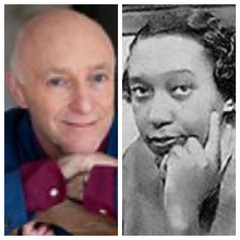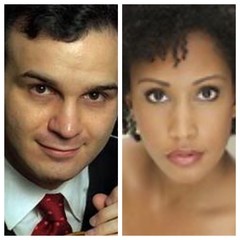|
Back
Mr. Botstein’s Prayers and War-Whoops New York
Isaac Stern Auditorium, Carnegie Hall
11/13/2021 - & November 14, 18, 2021
Julia Perry: Stabat Mater
Scott Wheeler: Birds of America: Violin Concerto No. 2 (New York Premiere)
George Frederick Bristow: Symphony No. 4 (“Arcadian”)
Briana Hunter (Mezzo-soprano), Gil Shaham (Violin)
The Orchestra Now, Leon Botstein (Conductor)

S.Wheeler/J.Perry
“I know nothing about this subject, but I do have prejudices, which I am more than happy to share with you.”
Leon Botstein
Leon Botstein’s international ensemble, The Orchestra Now (TŌN), started the season with an alien bang. Three centuries, three American composers, three different structures–and not a single work was familiar. This was excusable with Scott Wheeler’s Birds of America, since the work was played only once before, at Bard College, the home of TŌN. The Symphony by George Frederick Bristow would have been familiar about 150 years ago. But, outside of a Bronx school named in his honor, nobody hears him today. As for Julia Perry’s Stabat Mater written in 1951, I have only myself to blame. This opening work was staggeringly beautiful.
Ms. Perry wisely took the only “secular” medieval prayer, Stabat Mater, a mother’s grief for her dying son. Setting it for mezzo-soprano and string orchestra, Ms. Perry established the dark–and terrifying–thoughts of Mary. The composer did not hesitate to create dissonances when necessary, yet the basic tonal harmonies were still shattering.
Yes, this was a monodrama, but one never felt the structure or form. Instead one felt, as the singer enunciated every Latin syllable, at times rising to the top of her range, that this was an unending plea, a cry in the wilderness, a lyrical utterance.
The mezzo last night was Briana Hunter, whose range was effortless, whose voice never ceased its emotional power. Granted, before uttering a single note, Ms. Hunter’s dress–blinding with silver–was so hypnotizing it made Yuja Wang look like a frumpy fishwife. But within seconds, the passion, the sorrow, the breathtaking power of the music made her the dress understated.
The New York premiere was Scott Wheeler’s second violin concerto, Birds of America, with the always wondrous Gil Shaham doing the solo honors. Unfair as it might be, one had to compare this with another premiere earlier this year, John Luther Adams’ ten thousand birds. That might be described as an “interactive” work, the audience wandering around the musicians, the latter squawking, beeping, chirping, with duets and triplets... And while ten thousand birds might not be literally correct, one felt an endless forest’s sounds over a day.
Scott Wheeler (who, incidentally studied with that other avian composer, Olivier Messiaen) wrote this Concerto for Mr. Shaham, including a bird they heard while strolling through Central Park. In the meantime, for this rather short work, we heard some birds indeed. More important, the work contained cameos (the word of the annotator) from Vivaldi (easy to spot at the start), Respighi’s The Birds, and The Hot Canary!
They were difficult–and almost irrelevant–to spot. Like a kids’ puzzle-picture of a dense forest, where you must “spot the birds.” More important was such brilliantly original orchestration by Mr. Wheeler, which was supposed to imitate birds. And of course the lyrical lines from Mr. Shaham. Sometimes soaring, sometimes lyrical, always singing.
The longest, if not the most impressive work was by one George Frederick Bristow. Obviously he was mid-19th Century, where prominent folks almost always used three names. Not so obvious were Mr. Bristow’s early stints as Concertmaster of the early NY Phil, and very famous–for its time–orchestral and vocal works.

G. Shaham/B. Hunter (© Courtesy of the Artists)
And what about his Fourth Symphony? He had marvelous moments, each of them belied by four-square tonic-dominant endings preventing their achievement. Mr. Bristow certainly knew how to handle a huge orchestra. But so huge were the sounds especially in the final movement, that the notated “dance of the pioneers as they find a home” became not boisterous but clamorous, strident.
One resemblance was obvious. First, imagine (oh, fantasy!) that Antonín Dvorák had come to America and written a symphony and quartet or two which pictured 19th Century America without quotes, but pure American feeling.
Of course that’s ridiculous, but...
(Oh, wait...)
Anyhow, Mr. Bristow’s Fourth Symphony, written the same year as Dvorák’s Fourth Symphony sounded much like the Czech’s. Not with the genius but the great talent.
The most programmatic movement was “Indian War Dance,” which Dvorák would never stoop to. But Bristow surveyed the pretend-Wild West just as Borodin and Rimsky surveyed Russia’s pretend-Wild East.
Outside of its 2021 political problems, the ersatz Indian tunes were like those 1930’s Mickey Mouse cartoons of Indian war dances. The scherzo even included a middle section which obviously showed General Custer and his sedate military taking on the war-whoops and obviously subduing them.
Anachronistic, hardly gripping, but conductor Botstein gave the whole piece adequate belief and vitality.
Harry Rolnick
|